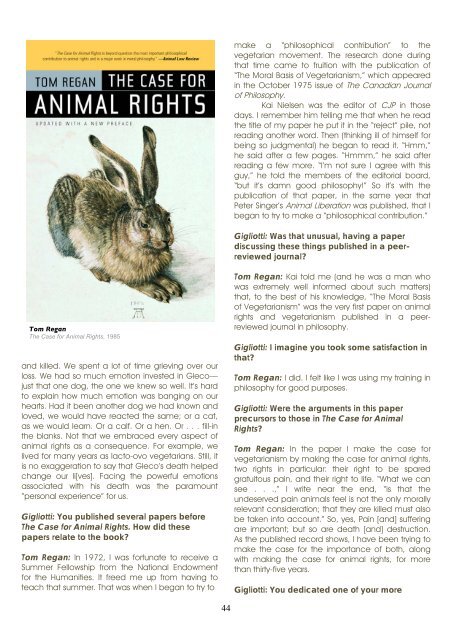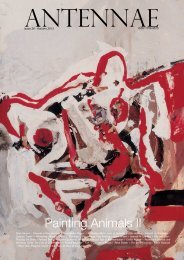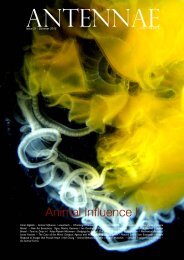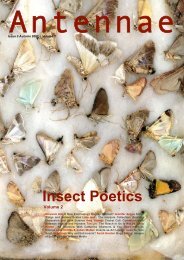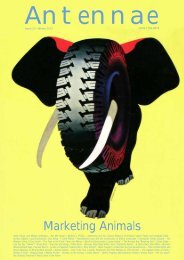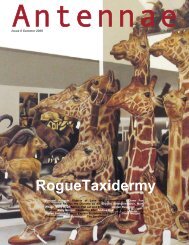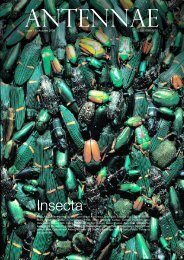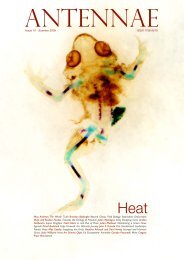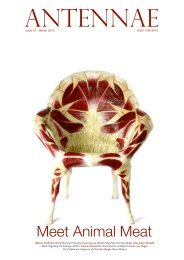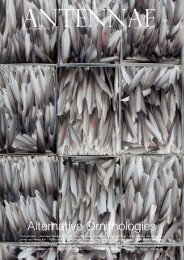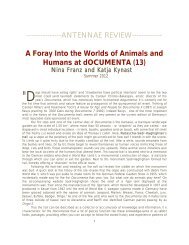Animal Wrongs and Rights - Antennae The Journal of Nature in ...
Animal Wrongs and Rights - Antennae The Journal of Nature in ...
Animal Wrongs and Rights - Antennae The Journal of Nature in ...
Create successful ePaper yourself
Turn your PDF publications into a flip-book with our unique Google optimized e-Paper software.
Tom Regan<br />
<strong>The</strong> Case for <strong>Animal</strong> <strong>Rights</strong>, 1985<br />
<strong>and</strong> killed. We spent a lot <strong>of</strong> time griev<strong>in</strong>g over our<br />
loss. We had so much emotion <strong>in</strong>vested <strong>in</strong> Gleco—<br />
just that one dog, the one we knew so well. It’s hard<br />
to expla<strong>in</strong> how much emotion was bang<strong>in</strong>g on our<br />
hearts. Had it been another dog we had known <strong>and</strong><br />
loved, we would have reacted the same; or a cat,<br />
as we would learn. Or a calf. Or a hen. Or . . . fill-<strong>in</strong><br />
the blanks. Not that we embraced every aspect <strong>of</strong><br />
animal rights as a consequence. For example, we<br />
lived for many years as lacto-ovo vegetarians. Still, it<br />
is no exaggeration to say that Gleco’s death helped<br />
change our li[ves]. Fac<strong>in</strong>g the powerful emotions<br />
associated with his death was the paramount<br />
“personal experience” for us.<br />
Gigliotti: You published several papers before<br />
<strong>The</strong> Case for <strong>Animal</strong> <strong>Rights</strong>. How did these<br />
papers relate to the book?<br />
Tom Regan: In 1972, I was fortunate to receive a<br />
Summer Fellowship from the National Endowment<br />
for the Humanities. It freed me up from hav<strong>in</strong>g to<br />
teach that summer. That was when I began to try to<br />
44<br />
make a “philosophical contribution” to the<br />
vegetarian movement. <strong>The</strong> research done dur<strong>in</strong>g<br />
that time came to fruition with the publication <strong>of</strong><br />
“<strong>The</strong> Moral Basis <strong>of</strong> Vegetarianism,” which appeared<br />
<strong>in</strong> the October 1975 issue <strong>of</strong> <strong>The</strong> Canadian <strong>Journal</strong><br />
<strong>of</strong> Philosophy.<br />
Kai Nielsen was the editor <strong>of</strong> CJP <strong>in</strong> those<br />
days. I remember him tell<strong>in</strong>g me that when he read<br />
the title <strong>of</strong> my paper he put it <strong>in</strong> the “reject” pile, not<br />
read<strong>in</strong>g another word. <strong>The</strong>n (th<strong>in</strong>k<strong>in</strong>g ill <strong>of</strong> himself for<br />
be<strong>in</strong>g so judgmental) he began to read it. “Hmm,”<br />
he said after a few pages. “Hmmm,” he said after<br />
read<strong>in</strong>g a few more. “I’m not sure I agree with this<br />
guy,” he told the members <strong>of</strong> the editorial board,<br />
“but it’s damn good philosophy!” So it’s with the<br />
publication <strong>of</strong> that paper, <strong>in</strong> the same year that<br />
Peter S<strong>in</strong>ger’s <strong>Animal</strong> Liberation was published, that I<br />
began to try to make a “philosophical contribution.”<br />
Gigliotti: Was that unusual, hav<strong>in</strong>g a paper<br />
discuss<strong>in</strong>g these th<strong>in</strong>gs published <strong>in</strong> a peerreviewed<br />
journal?<br />
Tom Regan: Kai told me (<strong>and</strong> he was a man who<br />
was extremely well <strong>in</strong>formed about such matters)<br />
that, to the best <strong>of</strong> his knowledge, “<strong>The</strong> Moral Basis<br />
<strong>of</strong> Vegetarianism” was the very first paper on animal<br />
rights <strong>and</strong> vegetarianism published <strong>in</strong> a peerreviewed<br />
journal <strong>in</strong> philosophy.<br />
Gigliotti: I imag<strong>in</strong>e you took some satisfaction <strong>in</strong><br />
that?<br />
Tom Regan: I did. I felt like I was us<strong>in</strong>g my tra<strong>in</strong><strong>in</strong>g <strong>in</strong><br />
philosophy for good purposes.<br />
Gigliotti: Were the arguments <strong>in</strong> this paper<br />
precursors to those <strong>in</strong> <strong>The</strong> Case for <strong>Animal</strong><br />
<strong>Rights</strong>?<br />
Tom Regan: In the paper I make the case for<br />
vegetarianism by mak<strong>in</strong>g the case for animal rights,<br />
two rights <strong>in</strong> particular: their right to be spared<br />
gratuitous pa<strong>in</strong>, <strong>and</strong> their right to life. “What we can<br />
see . . .,” I write near the end, “is that the<br />
undeserved pa<strong>in</strong> animals feel is not the only morally<br />
relevant consideration; that they are killed must also<br />
be taken <strong>in</strong>to account.” So, yes, Pa<strong>in</strong> [<strong>and</strong>] suffer<strong>in</strong>g<br />
are important; but so are death [<strong>and</strong>] destruction.<br />
As the published record shows, I have been try<strong>in</strong>g to<br />
make the case for the importance <strong>of</strong> both, along<br />
with mak<strong>in</strong>g the case for animal rights, for more<br />
than thirty-five years.<br />
Gigliotti: You dedicated one <strong>of</strong> your more


